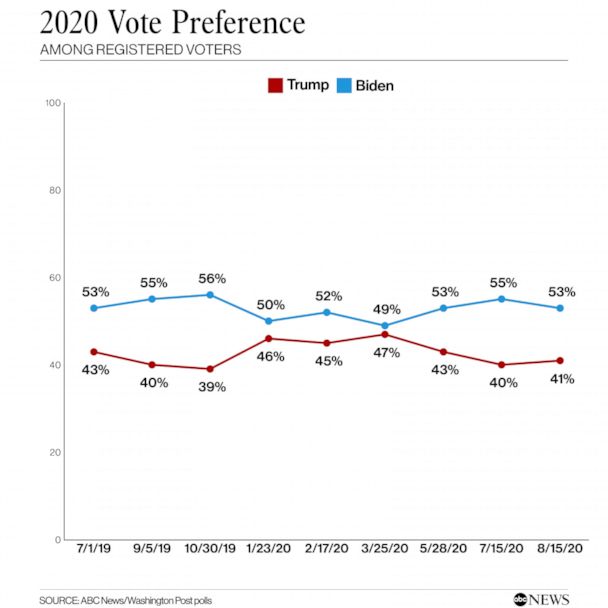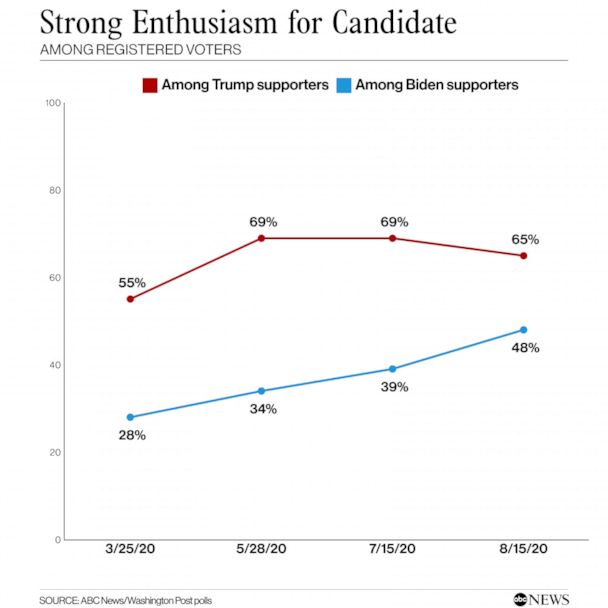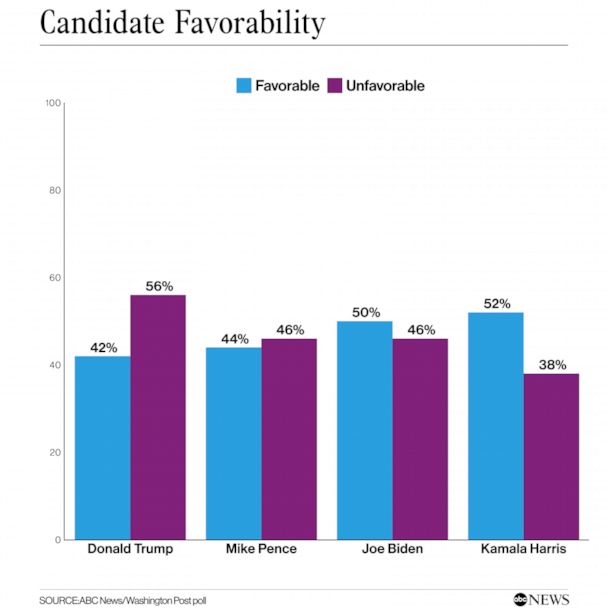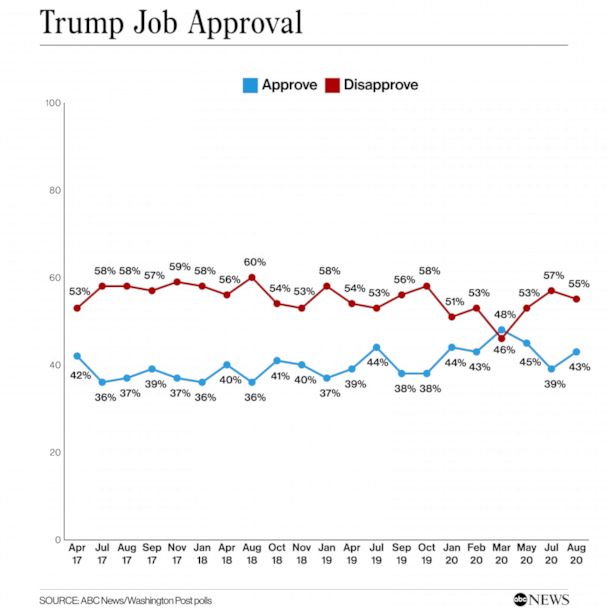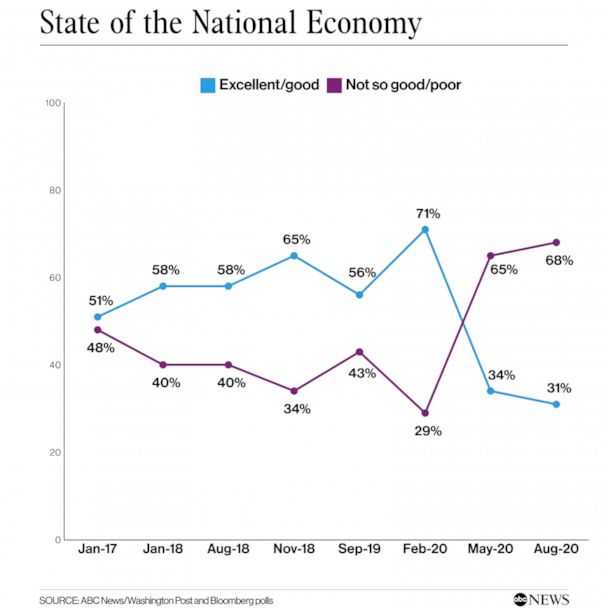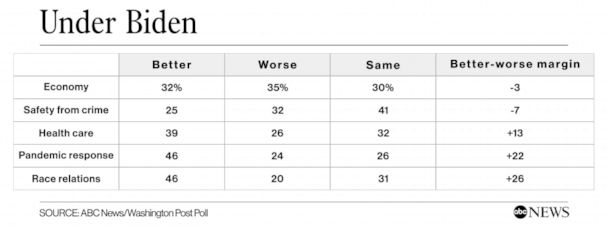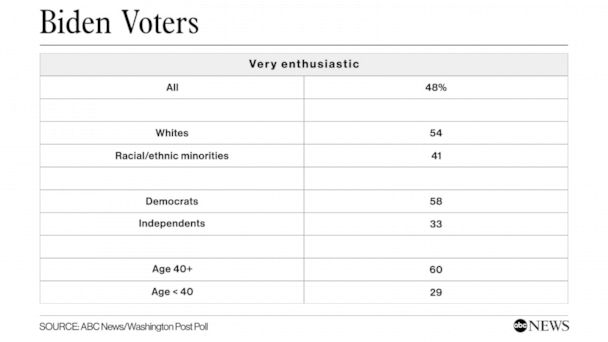Enthusiasm for Biden grows as former VP holds lead over Trump: Poll

A welcome reception for Sen. Kamala Harris and rising enthusiasm for Joe Biden mark President Donald Trump's challenges in the 2020 election, as do two realities on the ground: just 14% of Americans in the latest ABC News/Washington Post poll say the coronavirus pandemic is under control, and two-thirds say the economy is in bad shape -- the most since October 2014, when voters reacted with a vengeance.
As the virtual Democratic National Convention opens, Biden holds a 12 percentage-point lead over Trump among registered voters, 53-41%, and a similar 10 points among likely voters, 54-44%, with two and a half consequential months to go.
See PDF for full results, charts, and tables.
Beneath that result is an underlying shift: the share of Biden supporters who are very enthusiastic about supporting him has grown from 28% in March to 48% today. He still has a wide deficit on this gauge compared with Trump, with 65% strong enthusiasm, but it's eased considerably. It's a measure to watch because enthusiasm can encourage turnout, especially given the extra effort needed to vote in many states this year.
Biden's enthusiasm score started up before he selected Harris; it's risen in ABC/Post polls since May. Nonetheless, views of her selection are positive; as reported Sunday, Americans approve by a 25-point margin, 54-29%.
Moreover, 54% see Harris as qualified to take over as president if something happened to Biden, as many as those who say the same about Mike Pence and Trump. Just 33% see her as "too liberal" -- a GOP line of attack. And a narrow majority, 52%, sees her favorably overall, the only one of the four to cross that line. Biden toes it, at 50% favorability, vs. 44% for Pence and 42% for Trump.
Trump is the only one in the group to be seen unfavorably by most Americans, 56% in this poll, produced for ABC by Langer Research Associates. He's seen strongly unfavorably rather than strongly favorably by a 17-point margin, 46-29% -- about double the strongly negative margin for Biden, 8 points, 34-26%.
Looking back four years, Hillary Clinton had a favorability rating of 42% heading into her convention, 8 points below Biden's now. By late October, she and Trump were equally unpopular, taking favorability off the table as a differentiating factor in that election.
Trump/Pandemic
Trump's underwater favorability reflects views of his job performance overall -- 43% approve, while 55% disapprove, similar to last month. He remains the only president in modern polling, since the Truman administration, never to reach majority approval, with the lowest career average approval as president on record. Further, strong disapprovers of Trump's performance outnumber strong approvers by 18 points.
Fifty-nine percent disapprove specifically of Trump's handling of the pandemic. As many say it has had severe economic impacts in their community. Sixty-five percent remain very or somewhat worried they may catch the virus, steady for months. And, as noted, just 14% say the outbreak is completely or mostly under control.
Compared with community-level economic impacts, fewer, 29%, report severe economic impacts of the pandemic on their personal finances. That rises in some groups, to about four in 10 Black people, Hispanics, lower-income and younger adults and, notably, politically independent women. Independents can be swing voters.
Economy
Views of the broader economy typically outweigh personal finances in political considerations, and here is a root of Trump's risks. Sixty-eight percent of Americans say the economy is in not-so-good or poor shape, the most, as noted, in ABC/Post polls since October 2014 -- heading into the midterm elections that flipped the Senate to the then out-party Republicans and boosted their margin in the House.
Negative ratings of the economy are up 20 points since Trump took office, double their level in November 2018 and 39 points higher than in a Bloomberg survey in February, a month before the pandemic came crashing in.
These views matter: among registered voters who say the economy is in excellent or good shape, 79% support Trump and Pence. Among those who say it's in bad shape, by contrast, 70% support Biden and Harris -- rising to 84% of those who give the economy the worst rating, poor.
Indeed, in a statistical analysis called regression, including controls for partisanship, ideology and demographic variables, discontent with the national economy is a significant independent predictor of vote preferences, as is worry about catching the coronavirus -- both negatively for Trump.
Better with Biden?
Given current conditions, if voters cast a ballot on the basis of the economy, Trump's got trouble. On the other hand, if it's a question of whether Biden would have done a better job handling the economy, the ground is more even: the public splits roughly in thirds on whether, if Biden were president, the economy would be in better shape than it is now (32%), worse (35%) or about the same (30%).
That said, there are three other measures on which more people think things would be better than worse if Biden were president: Handling the country's response to the pandemic (seen as better under Biden by a 22-point margin), health care (13 points) and race relations (26 points).
Trump prevails in assessments of whether safety from crime would be better or worse under Biden -- 25% say better, 32% worse. The margin here is largest in rural areas, where Trump generally is more popular, but also is substantial, 20 points, among suburban whites.
It's an open question whether or not Harris, with her prosecutorial background, can offer Biden assistance on perceptions of handling crime. Informed that she's a former San Francisco district attorney and California attorney general, 32% say they have a more favorable opinion of her, 16% less favorable.
More broadly, as is typical for a vice presidential candidate, most people by far -- 71% -- say Harris won't have any impact on their voting decision. Of the rest, 17% say she makes them more likely to vote for the Democratic ticket, 10% less likely, a 7-point net positive, when each point can count.
The course of the campaign likely will matter here: in an epic case of VP-backfire, Palin's presence in 2008 started with 19% of registered voters saying it made them less likely to vote for the Republican ticket -- and went as high as 46% (of likely voters) saying so.
Vote Groups
Among registered voter groups, Biden leads Trump by 8 points in the suburbs, 51-43%, essentially steady since May. Biden's advantage is far bigger in urban areas, 67-29%, where he needs turnout. In rural areas Trump leads by 24 points, down from 47 in March as the pandemic has spread.
Critically, Biden has a 17-point lead among independents, 54-37%, potentially a swing group that Trump won by 4 points in 2016. Whites divide closely, 50-45%, Trump-Biden, compared with Trump +18 points in March; Biden's +45 points among racial and ethnic minorities. And men have moved toward the Democrat; they now divide 51-43%, Biden-Trump. Biden is +16 points among women.
Onward
Trump has reached for ideology as pushback. Overall, it may not fly: about as many Americans call him too conservative, 34%, as see Biden as too liberal, 36%. Similarly, 33% say Harris is too liberal; about as many, 36%, call Pence too conservative.
About equal numbers call all four of these candidates "about right" ideologically, 43 to 47%, with vast differences among groups, of course. As such, Trump's approach on ideology wars looks to be more about motivating his base than claiming a middle ground.
Overall, these results suggest the Democrats will pound hard on the economy and the pandemic, as well as their traditional advantages on health care and race relations, while Trump seeks to motivate his base, push on crime, and hope for improvements in the pandemic and the economy.
Biden, to be sure, has his own set of risks. Among registered voters, strong enthusiasm for his candidacy has grown especially among whites (+27 points since March, to 54%), people age 40 and older (up 25 points, to 60%) and mainline Democrats (up 24 points, to 58%). It's notably lower among racial and ethnic minorities, independents and younger adults -- groups in which turnout can lag.
In the end, though, incumbent elections are first about the incumbent. Trump's support is more affirmative: Seventy-three percent of his backers say their aim is to support him, not to oppose Biden. For Biden, it's different: A majority of his voters, 59%, are more focused on beating Trump than on supporting Biden.
Negative motivations aren't always as powerful as positive ones, but they can suffice - as demonstrated by none other than Trump himself, four years ago. At this point in 2016, 57% of his supporters said they cared most about opposing Clinton, not supporting him - virtually matching the share of Biden supporters who say the same about Trump today.
Methodology
This ABC News/Washington Post poll was conducted by landline and cellular telephone August 12-15, 2020, in English and Spanish, among a random national sample of 1,001 adults. Results have a margin of sampling error of 3.5 points, including the design effect. Partisan divisions are 31-26-37%, Democrats-Republicans-independents.
The survey was produced for ABC News by Langer Research Associates of New York, N.Y., with sampling and data collection by Abt Associates of Rockville, Md. See details on the survey's methodology here.
This report was featured in the Monday, Aug. 17, 2020, episode of "Start Here," ABC News' daily news podcast.
"Start Here" offers a straightforward look at the day's top stories in 20 minutes. Listen for free every weekday on Apple Podcasts, Google Podcasts, Spotify, the ABC News app or wherever you get your podcasts.


